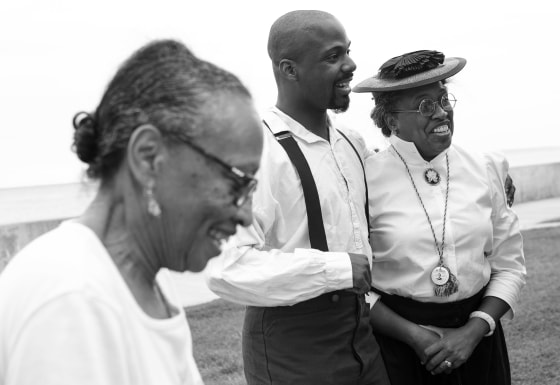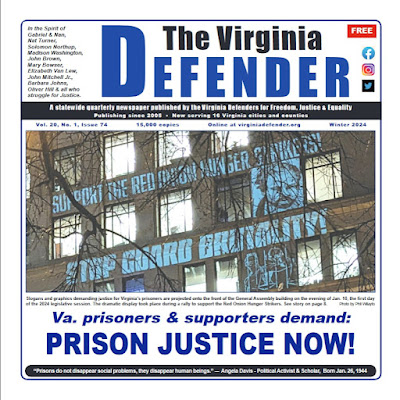A bit of news coverage of 400th anniversary events
The NYTimes journalists--Nikole Hannah-Jones, Linda Villarosa, Wesley Morris--produced a series of essays called The 1619 Project, published on August , 2019. In a follow-up radio segment they discuss the creation of this project.
The Defenders are excited to share the two following news stories that include Defenders' members in commemoration of the history and impact of 400 years of slavery, resistance and progress:
The Defenders are excited to share the two following news stories that include Defenders' members in commemoration of the history and impact of 400 years of slavery, resistance and progress:
 | ||
| Joseph Rogers; his grandmother, Margaret Johnson Cason; and his mother, Ajena Rogers, at the federal 1619 commemorative event. Julia Rendleman / for NBC News |
Joseph Rogers said he sees his work as a "public service, a way to meet a very real need for a better understanding of our history."
 | ||
| Image of a state marker noting the first Africans in Virginia, located just outside Fort Monroe National Monument. Credit: NPS Photo |
NPR's With Good Reason - 400 years after 1619
(Click here for full transcript)
Fort Monroe's 400-Year Legacy (15 min.)
With: Terry Brown (National Park Service)
In late August 1619, twenty or more enslaved Africans arrived in Virginia at what’s now called Fort Monroe. They were the first Africans documented in British North America. We speak with Terry Brown, Fort Monroe’s park superintendent about how the park–and America–are commemorating their arrival.
Segment: The Descendants (3 min.)
With: Walter Jones, Verrandall Tucker, and Vincent Tucker
We hear from the Tuckers, the descendants of the very first African-American baby, and learn about their work to uncover the stories of their ancestors. Hear more from the Tuckers on our sister show, BackStory.
Segment: A Conscious Voice (9 min.)
With: Synnika Lofton (Norfolk State University)
Poet Synnika Lofton reflects on 1619 and shares how he channels his political thoughts into art.
Segment: Honoring Gabriel's Rebellion (17 min.)
With: Ana Edwards (Virginia Commonwealth University, Sacred Ground Historical Reclamation Project)
When Ana Edwards first heard the story of Gabriel, an enslaved blacksmith who attempted a rebellion in Richmond, Virginia, she knew she needed to share it. She explains how new efforts to commemorate the lives and rebellions of enslaved Virginians in this Confederate capital are reshaping Richmond today.
Segment: Written in the Margins (7 min.)
With: Joshua Poteat
Richmond poet Joshua Poteat shares how he has been inspired by Gabriel’s story.
